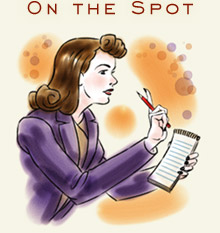Emdashes—Modern Times Between the Lines
The Basics:
About Emdashes | Email us
Ask the Librarians
Best of Emdashes: Hit Parade
A Web Comic: The Wavy Rule
Features & Columns:
Headline Shooter
On the Spot
Looked Into
Sempé Fi: Cover Art
The Economist, the Director, the Neurologist, and the Playwright
Filed under: On the Spot Tagged: 92Y, Adam Bock, Charles Darwin, economics, neurology, Peter Sellars, Playwright Horizons, Raj Patel, Rubin Museum of Art, theater, V.S. Ramachandran

Martin Schneider writes:
This week in events, we have a conversation, a lecture, and a play.
The Conversation. The Rubin Museum of Art in Chelsea, dedicated to the art of the Himalayas, hosted a weekly series called "Talks about Nothing"; it started last October. By a stroke of luck, I happened to catch the very last one (there were 26 events in all) this past Saturday evening. The series has attracted luminaries of all sorts to the sedate stage of the Rubin, and the one I happened to see featured Raj Patel, a young economist of renown, and Peter Sellars, a less young stage and opera director of renown. Patel has recently written a book called The Value of Nothing, which made him a perfect guest for this series.
Patel is young, sharp, and gentle, and speaks with a cultivated English accent. The theory presented in his book seems to be a jab against materialism and a celebration of the ineffable skills of nurturing, community organizing, household maintenance, and so forth, which Western economics generally valuates as "nothing." The chat proceeded along such hyper-idealistic lines. In some ways it was a talk ideally suited to the Rubin, whose Buddhist calm (and evident money, somewhere) seems to attract well-meaning, educated, and affluent New Yorkers even more than 92Y does.
I think my favorite bit was when Patel said, "Taxation is a better way of redistributing wealth than letting some wealthy men on boats decide what they want to spend money on." Amen to that. (The line drew applause.) I wish the talk had been a little more structured than it was—Sellars in particular is prone to meandering run-on sentences that do hit a lot of good points but are still, well, very long. However, it would be churlish to suggest that the discussion was not stimulating and intelligent. It was, and I wish I'd seen more of these "Talks about Nothing." This was the first event at the Rubin I've ever seen, and I will be on the lookout for more.
The Lecture. On Tuesday night I had the pleasure of seeing V.S. Ramachandran at 92Y. It's funny, I see a lot of illustrious people stand on stages and speak, but it's rare that I see someone deliver an actual lecture. The one that Ramachandran delivered was top-notch. Ramachandran has become renowned for a kind of investigative neurology—the most mentioned example is his work on phantom limbs—wherein he exploits a given patient's lesion-induced lack of a specific ability—for example, a patient's inability to recognize his own mother—to wheedle out truths about the human brain and the evolution that created it.
Ramachandran spoke in the unfussy patter of the scientist, intermittently sprinkled with witty and caustic asides on his unimaginative colleagues (or critics). In addition to a brief bit on the already well publicized phantom limbs story, Ramachandran spoke vividly about the potentially immense importance of "mirror neurons," recently discovered to exist in the brain. Mirror neurons allow humans (and other primates) to analogize from the actions of other creatures, and this wondrous mental gift may have allowed humans to adapt at a rate faster than the glacial speed of Darwinian evolution. He also spoke evocatively about the importance of synesthesia in allowing us to understand the importance of metaphor to human thought. Stirring, ambitious stuff!
All in all, I had the impression, watching Ramachandran, that I was watching an unusually exceptional person. I'm grateful for 92Y for presenting him to the audiences of New York (although, as he has a new book to sell, he won't be hard to find).
The Play. On Thursday I went to Playwright Horizons on 42nd Street to see A Small Fire, by Adam Bock. The run of the play is now over, alas—it was an intuitive gem. A specific thing happens to one of the characters over the course of the play, which I won't reveal, but A Small Fire is about the way family and friends adjust to new frailty in one among them. Not everyone reacts well, but some do.
Bock makes some unusual decisions, but for me they all paid off handsomely. One example was a speech towards the end that was threatening to become mawkish—at that precise moment the character, distracted by the all-important arrival of his racing pigeon, starts shouting and pointing and thus the scene ends. Canny self-awareness there on the part of Bock. Furthermore, the nuances and speech patterns of people who know each other very well are excellently captured, and the emotional payoff at play's end—nearly wordless—is superficially shocking but entirely apt and earned. Bravo.
That's all for this week. Be sure and see some events of your own! You know I'll do my part.


